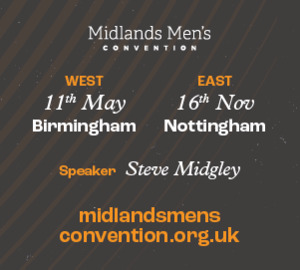Isn’t it time we start fighting for women rather than against them?
‘The blog made very uncomfortable reading and would be utterly crushing to a pastor's wife’, 'I couldn't even finish this blog, I felt so sick and humiliated', ‘I was left really concerned about the bruising tone of this article'. What are the blogs these women read to leave them feeling like this?

A weird off beat lone ranger Pastor mishandling the Bible? Or blogs posted by well respected mature pastors backed by churches and organisations?
Sadly it’s the latter.
If you are on social media, then you won’t have missed the furore that’s happened recently. If not, I’m talking about ‘that’ or rather ‘those’ blogs. Both are now withdrawn, but the impact continues.
The first blog was about church planters and their wives who weren’t keen on church planting. It was written by Mez McConnell of 20 Schemes. The blog seemed to suggest crushing expectations on women. He says, ‘I can say without doubt that one of the biggest causes of failure within pastoral ministry has been down to disharmony within the marriage.’ He later suggests that wives were to blame. He says, ‘almost every man I have let go over the last 10 years has come down to the fact that his wife is just not helpful to him in his ministry’. There were many derogatory comments too. He used a gender-neutral passage and applied it to women, ‘she must not be given to slander or gossip (Titus 2). This is the curse of the female species, particularly in ministry’. The blog is now removed, but there are still articles and podcasts with very similar rhetoric on the 20 Schemes website.
The second blog is ‘Sex Won’t Save You (But It Points to the One Who Will)’. Josh Butler wrote this, and The Gospel Coalition published it. The blog focused on Gods vision for sex, using metaphors from Ephesians 5. It explored how the human sexual act symbolizes and sacralizes Christ’s relationship with the church. Josh says, ‘sex is an icon of salvation’, he uses the sexual act to describe our relationship to Christ. He says, ‘generosity and hospitality are both embodied in the sexual act.’ Some may not object to this theology or reasoning. But for many the lack of mutuality in the discussion was a huge issue. One reader commented ‘this blog has misconstrued the marriage metaphor in Ephesians 5, making it pornographic, male-centric, and ripe for abuse.’
Both blogs have common threads. Neither exist anymore, both speak negatively about women, and both claim to be good for women but are actually dangerous. The first blog was pulled for tone, the second blog pulled for lack of context. Neither pulled for content, neither with a decent apology to women. I don’t want to go over old ground. You can read summaries of the debates online. I want to ask a bigger question… ‘Isn’t’ it time we start fighting for women rather than against?
Listen to your sisters
In the light of these blogs, take time to listen to women in your church. Find out how these articles have impacted them. After blogging about Mez’s article, only one of my male friends got in touch. Yes, the blog wasn’t about me, I’m married to a scientist, so I’ll never be a Pastors wife. But, the article hurt because it hurt my friends, whom I love and respect. Listen and respond to friends when they talk about the impact of reading these blogs. A message in a card or a text or a phone call to ask how they found it would mean so much.
Stand up for your sisters
To complicate the story of Josh’s blog, he also had a book coming out soon. In an attempt to rectify the situation and add context, The Gospel Coalition released a chapter from his forthcoming book. But readers criticized the author, with some saying, ‘he misconstrued the marriage metaphor in Ephesians 5'. And then, in another twist, one of the endorsers admitted that he had not read the whole book. There was shock and discomfort as many investigated who had endorsed his book and why they had done so – the endorsers had either agreed with the author, or they hadn’t read the book and yet given a wholehearted endorsement. The firestorm about Josh was taken to another level as Publishers came under fire. Katelyn Beaty said in Christianity Today magazine, ‘authors and endorsers are simply playing a game set by the industry. And now is a good time for industry leaders to consider dropping endorsements altogether.’
The aftermath that followed felt like a school playground. Some were discussing the issue in hand. And others? Simply making jokes about endorsements. I felt sad that many came out for the discussion on endorsements, but very few of my British male Twitter friends in defence of the weird theology of sex and the gospel in the blog. Standing up for your sisters means speaking out in support of them.
Speak about your sisters
There are so many incredible Bible stories about women. We know these because the Holy Spirit inspired men to record them for the good of God’s people. Lets be people that talk about women, share stories in sermons, read books by women. Let's have conversations about women you’ve learnt from whether that’s past or present.
Apologise to your sisters
Where you see yourself, the church, others fail, say sorry! The lack of apologies relating to these two blogs is telling. Women are sharing their hurt, their experiences and yet it’s all put down to a misjudgement in tone. Or not understanding the full picture. Where we’ve added hurt we need to apologise. Ask questions of them, find out why this hurt. Ask the Lord to remove the plank in your eye before focusing on the speck in theirs. March hosted both Women’s History Month and International Women’s Day, two days to celebrate the achievements of women and to act against disparity. Both are fantastic opportunities to join a conversation, ask questions and engage with the theme.
On International Women’s Day, the Passion for Evangelism network took on a challenge. We wanted to create evangelistic posts for social media and with peer feedback and encouragement, six women created posts. Ellidh Cook wrote an excellent blog called ‘How Jesus brings equity to a world of inequity'. She concludes by saying…
‘Jesus isn’t anti-women, but this world is’.
How we speak about women shows the world what Jesus thinks. How the church speaks of women shows the world what Jesus thinks.
For every blog post I write about women in the church I always end up giving a reason for the hope I have. Within days I have conversations with local friends that have read my posts, whether that’s on the way back from the school run, at our weekly coffee or through Whatsapp Voice notes. In each of them I listen, hear the pain of what they hear the church saying about women and reply this is not what Jesus thinks. Isn’t it time we do better and speak of women like Jesus does?
Naomi Dawson leads Passion for Evangelism, a mentoring and networking group for female evangelists.



